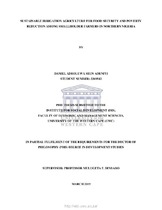Sustainable irrigation agriculture for food security and poverty reduction among smallholder farmers in Northern Nigeria
Abstract
Nigeria, like many African countries is caught up in the uncertainty of the effectiveness of
agricultural intervention in achieving food security, poverty reduction and improved quality of
life. This ambiguity is more pronounced especially in rural areas where majority of the poor and
those involved in agriculture reside. Indeed, issues relating to resource utilization and productivity
in the agricultural sector and how they affect livelihoods and food security of smallholder
households remain underexplored. The study examines the contribution of small-scale irrigation
agriculture towards ensuring food security and poverty alleviation among smallholder households.
It assesses the productivity, food security and livelihoods status of smallholder households in the
Middle Rima Valley Irrigation Project, North West Nigeria, the relationship that exist between the
phenomena, as well as factors influencing them. It also explores smallholder households’
differentials on the basis of their efficiency, food security and income status, and what other factors
determine the smallholder typologies.
The research was situated within three bodies of theoretical work; political ecology, political
economy of food and agriculture, and sustainable livelihoods. This was done with a view to
providing a nuanced understanding of both the micro and macro processes and factors influencing
agricultural production, food security and livelihoods of smallholder households. A concurrent
triangulation mixed methods research design was adopted for the study. This involves the use of
both quantitative and qualitative methods of research to drive the research agenda. Systematic
random sampling technique was used to collect data for the quantitative aspect and purposive
sampling was used to select participants for semi-structured interviews for the qualitative research.
A total of 370 questionnaires were administered but 306 questionnaires were successfully
completed and returned, representing an 83% response rate. Also eight respondents were
interviewed for the study. While thematic content analysis was used to analyse the qualitative data,
quantitative data was analysed using both descriptive and inferential statistics.

